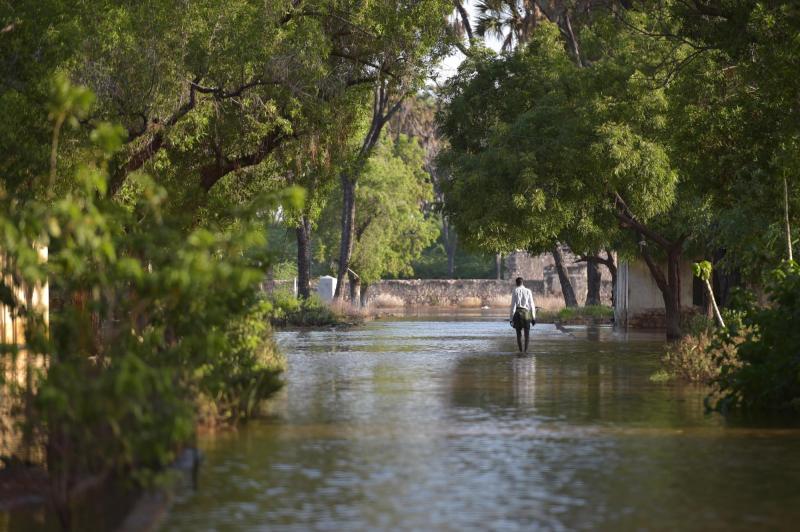Global Platform for Disaster Risk Reduction 2025
SPARC will be taking part in the Global Platform for Disaster Risk Reduction 2025: the global forum for discussing the latest developments and trends in reducing disaster risk.
Event date and time
Since 2020 SPARC has generated new evidence on how to manage and reduce disaster risks in the drylands of Africa and the Middle East. Our work has focused on people living in some of the world’s most fragile countries, which are affected by conflict and complex crises.
SPARC researchers will be taking part in the Global Platform for Disaster Risk Reduction 2025. Catch up with them at the following events:
2 June 2025, 13:30-14:30 (UTC+2 Geneva), CICG- Room 11+12
In this session SPARC researchers will speak alongside a range of experts about how to fund disaster risk reduction in some of the world’s most fragile and conflict-affected contexts. We will be sharing SPARC work on effective disaster risk reduction approaches in fragile contexts, and reflecting on what is required to unlock private sector investment in places which are underserved or categorised as ‘high risk’. Find out more about the event here.
3 June 2025, 09:00-10:00 (UTC +2 Geneva), Plenary B CICG
SPARC researchers are making an intervention in this session about what Early Warnings for All looks like in fragile and conflict-affected contexts. Find out more about the event here.
5 June 2025, 18:15-19:15 (UTC+2 Geneva), Plenary A CICG
Kelvin Shikuku’s work on the Drought Index-insurance for Resilience in the Sahel and Horn of Africa (DIRISHA) project has been shortlisted for this award. The winner of the award, the theme of which is "Connecting science to people: democratizing access to innovation and technology for disaster resilient communities", will be announced on 5 June 2025 at the Global Platform for Disaster Risk Reduction. Find out more about the awards ceremony here.
Kelvin’s work on the DIRISHA project is co-funded by SPARC, the Accelerating Impacts of CGIAR Climate Research for Africa (AICCRA) and CGIAR Research Initiative on Livestock and Climate. The project involves working with thousands of pastoralists in Kenya and Ethiopia by using participatory crowdsourcing techniques and citizen science to engage them in the monitoring of multi-dimensional indicators of shocks and resilience. The project builds pastoralists’ capacity in the use of digital innovations and strengthens local social networks to promote the sharing of crowdsourced information, which is disseminated weekly via digital channels. Find out more about the Sasakawa Award here, the ongoing research Kelvin has been nominated for here, and read this SPARC policy brief.
- SPARC researchers will be attending and feeding SPARC knowledge into sessions around disaster risk reduction in fragile and conflict-affected contexts, anticipatory action, people-centred early warning systems, disaster risk and climate finance, transboundary climate risks, food and water security and gender amongst other areas.
- SPARC researchers have fed into a blog on 'Ten years of Sendai: five big changes in disaster risk reduction and what comes next' (forthcoming – link to be shared soon).
- SPARC researchers will be sharing working drafts of two policy briefs on 1) advancing technical understanding of how to support disaster risk reduction and 2) anticipatory action in fragile and conflict affected contexts.
SPARC’s work on disaster risk reduction in recurrent and protracted crises
SPARC's work has:
- Analysed the sources and limitations of people’s resilience to a range of shocks in the drylands, including climate change, conflict, Covid-19, food price increases, farmer-herder conflict and El-Niño;
- Identified several ways in which aid agencies, governments and donors can support pastoralists, agro-pastoralists and farmers living in the drylands to build their resilience and manage shocks;
- Generated new data on the costs of climate change in the Sahel and Horn of Africa;
- Made the case for investing in long-term resilience, including through climate adaptation, as short-term measures – such as anticipatory action – are not enough to support people living through complex crises;
- Focused on how to overcome the conflict bind spot in international climate finance;
- Analysed transboundary climate risks, and made recommendations for how African regional economic communities and their Member States can work together to manage these risks;
- Evaluated what happens when resilience-building projects close and highlighted policy implications for how to best support resilience in fragile and conflict-affected contexts; and
- Highlighted how early warning systems, weather forecasts and other climate information services can help pastoralists adapt and manage climate risks in the Horn of Africa
